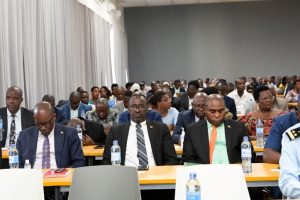BUJUMBURA, September 4th (ABP) – As part of the assessment of the current situation of the “MPOX” monkeypox epidemic, the Prime Minister, Gervais Ndirakobuca, held a national mobilization meeting on Monday, September 2, 2024, for all players involved in the fight against the monkeypox epidemic.
On that occasion, the Prime Minister first recalled that the concern of the Government of Burundi is that all Burundians should be in good health, which is the foundation of sustainable development. In addition, Burundi’s vision of “a country emerging in 2040 and developed in 2060” is based on the good health of all Burundians.
In the field of health, he recalled, the Government of Burundi, through the Ministry of Public Health and AIDS Control, had declared the first cases of monkeypox virus on July 25, 2024.
The Prime Minister thanked the doctors who are working wisely and treating those affected with care.
On that occasion, the Prime Minister recommended that all Burundians be made aware of the need for all households, offices and the entrances to the various markets to have hand-washing facilities at their entrances, so that hands could be washed regularly. He called on all Burundians to respect the preventive measures laid down by the Ministry of Public Health to combat that virus.
In her speech, the Minister of Public Health and the Fight against AIDS, Mrs. Lydwine Baradahana, pointed out that monkeypox is a viral disease that spreads from animals to humans, but is also transmitted through close physical contact.

According to her, by the end of August, current statistics showed that among the more than 1,100 people who alerted ,950 people were screened, the screenings confirmed 313 positive cases and 148 people were cured.
According to Minister Baradahana, that disease can lead to death if treatment is delayed, she added.
During the presentation, Dr. Liliane Nkengurutse, Director General in charge of epidemic prevention at the Ministry of Public Health, gave a general overview of MPOX and the epidemiological situation in Burundi, note that the disease is characterized by fever, headache, sore throat, fatigue, enlarged lymph nodes, muscle pain and a generalized rash. But also, she said, pulmonary, ocular, even blindness, digestive and cerebral complications and abortions can occur.
Dr. Nkengurutse also pointed out that the most affected age groups are children under 15, with a proportion of 53.7%. On that occasion, she advised the Burundians to help those with signs, avoid all contact with wild animals in particular, those found sick or dead, wear masks and wash their hands frequently with clean water and soap. For those recovering from the disease, especially men, she recommended using condoms during sexual intercourse because, she explained, the monkeypox virus can remain in semen for up to three months. That will help reduce the risk of smallpox infection.

The main modes of transmission are through any form of bodily contact with an infected person or objects that have been in contact with the patient and/or secretions from the patient or infected animal, respiratory droplets or short-range aerosols.
After experiencing that disease in Burundi, the government, through the Ministry in charge of public health, in collaboration with its partners, drew up a plan to respond to the MPOX epidemic, which will cost BIF 42 billion (USD 14,416,091). The government of Burundi has already released around 1 million dollars as a contribution to that smallpox response plan, according to the Minister of Public Health and AIDS Control.

